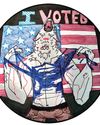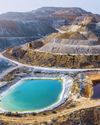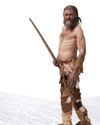What if We Treated Melting Ice Like Other Possible Catastrophes?

You hop in the car to ride to soccer practice. What do you expect to happen on the way? You might have to waste time stuck in traffic or sit through awful music on the radio. But the trip will almost certainly go smoothly, as usual. You might even make great time and get to hear your favorite song. Yet you buckle your seat belt anyway. Why do you do that? Because every time you get in a car, there is a very small chance that you might get in an accident that could hurt or even kill you.
In 2014, about 35,400 people died in accidents involving vehicles. Each year, Americans have about a 1 in 48,000 chance of dying while riding in a car. Of course, that translates to a 99.99 percent chance of not dying that way.
However, we still put a lot of effort into trying to prevent injury or death in a car accident, notes Richard Alley, a climate scientist at Penn State. We put on seat belts. Our cars feature airbags and self-braking systems. Parents buckle babies in car seats. Police monitor driving speeds and arrest drunk drivers. Alley says, “We put a lot [of money and effort] into something we do not expect to happen [to us] because if it were to happen, it would be so bad.”
We all agree that wearing a seat belt in a car is a good idea. We don’t expect a catastrophe, but one is possible. So it makes sense to buckle up to try to avoid the worst possible outcome. Now think about climate change. Does our planet need a seat belt?
For Better or for Worse The future of Earth’s climate is a lot like a trip in the car, except instead of traveling to soccer practice, imagine that you’re on a road trip to a tournament hundreds of miles away. There’s a pretty good chance that you’ll run into obstacles such as traffic, construction, or bad weather, but you expect to get there safely.
Diese Geschichte stammt aus der February 2017-Ausgabe von Muse Science Magazine for Kids.
Starten Sie Ihre 7-tägige kostenlose Testversion von Magzter GOLD, um auf Tausende kuratierte Premium-Storys sowie über 8.000 Zeitschriften und Zeitungen zuzugreifen.
Bereits Abonnent ? Anmelden
Diese Geschichte stammt aus der February 2017-Ausgabe von Muse Science Magazine for Kids.
Starten Sie Ihre 7-tägige kostenlose Testversion von Magzter GOLD, um auf Tausende kuratierte Premium-Storys sowie über 8.000 Zeitschriften und Zeitungen zuzugreifen.
Bereits Abonnent? Anmelden

A 12-Year-Old Girl's Election Sticker Is a Winner
VOTING IS A FUNDAMENTAL FREEDOM FOR AMERICANS, A MEANS OF DOING ONE'S CIVIC DUTY AND A WAY AN INDIVIDUAL CAN EXPRESS THEIR VOICE. In 1971, the United States lowered its voting age to 18. But that doesn't mean kids and teens under 18 can't participate in elections in various ways.

If everything the human brain does is basically sets of electrical impulses, how exactly does that translate into a state of mind?
You're not the only one asking this question. Every neuroscientist in the world is wondering the exact same thing, says Zach Mainen

EARTH'S TINIEST BUILDERS
THE HIDDEN WORLD OF MICROBES IN THE EARTH'S CRUST

MUMMIES SPEAK
ABOUT MICROBES, MIGRATION, AND MORE

GOING WITH YOUR GUT
HOW DO MICROBES AFFECT OUR HEALTH? LET'S COUNT THE WAYS...

BUG Detective
A burglar sneaks into a house on a quiet street in New York City. He walks through the house, touching countertops and door handles. Finally, he steals a single card from a full deck. Then he leaves.

Little Creatures Among Us THE MANY MICROBES IN OUR DAILY LIVES
When you think you're alone, you're actually not. In the ground, the air, your room, and even your body are Strillions and trillions of creatures so tiny you can't see them.

A Mars Rock Found With Leopard Spots Could Be a Sign of Ancient Life
IN JULY, NASA'S PERSEVERANCE ROVER CAME ACROSS A SPOTTED ROCK IN WHAT WAS ONCE A RIVERBED IN THE JEZERO CRATER ON MARS.

Para Athlete Uses Exoskeleton Suit to Carry the Olympic Torch
In July, a 36-year-old French tennis para athlete, Kevin Piette, got a chance to participate in this summer’s Olympic torch relay without using a wheelchair.

Ancient Egyptians May Have Used a Water System to Lift Stones to Build Pyramid
HOW ANCIENT EGYPTIANS BUILT THE MASSIVE PYRAMIDS IN EGYPT MORE THAN 4,000 YEARS AGO HAS LONG BEEN A TOPIC OF WONDER AND DEBATE.